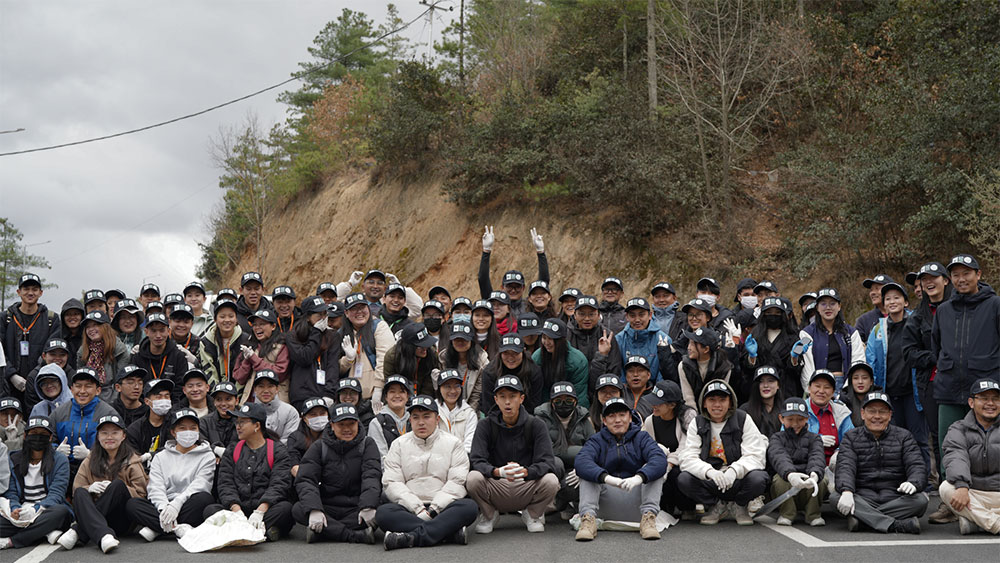YK Poudel
Over one hundred youth representing various groups, including conservation organisations, government and non-government bodies, members of the Central Monastic Body, and college students, embarked on a meaningful hike from Druk School to Kuenselphodrang in Thimphu this past Saturday.
These young advocates were commemorating ‘Earth Hour 2024’—an annual event celebrated globally as the paramount hour dedicated to planet Earth, with a resounding call-to-action: “Give an hour for Earth.” This dedicated hour serves as a united effort to combat the daily human-induced impacts on our environment.
The programme was organised not just as a recreational activity but also as a purposeful endeavour to clean up trash along the road leading to Kuenselphodrang.
Following the plogging event, participants came together to offer 1,000 butter lamps, symbolising their commitment to environmental stewardship and preservation.
Chimi Rinzin, Country Director of World Wildlife Fund (WWF) Bhutan, said that Earth Hour has inspired numerous actions to address climate change and biodiversity loss over the past decade.
“At WWF-Bhutan, inspiring change and stewardship form an integral part of our behavioural change approach, which is aimed at cultivating the understanding and appreciation for our natural world,” he said.
He expressed hope in nurturing proactive advocates who champion sustainable practices for biodiversity conservation, thereby contributing to both the economy and societal well-being.
Earth Hour, according to Chimi Rinzin, serves as a crucial platform to engage the most dynamic segment of society—the youth. This year alone, over 1,800 youth participated in various activities across the nation, showcasing their commitment to environmental action.
Yves Calmette, Senior Director of Brand and Network Communications at Earth Hour Global, said that in the face of apolarised society struggling to tackle the scale and pace of the dual climate and nature crises, Earth Hour is all about bringing people together for a common cause.
“By aligning Earth Hour actions with people’s interests and passions through the hour bank, we make it easy for individuals, particularly those who aren’t engaged yet to contribute positively to the planet while doing activities they are passionate about,” Yves Calmette said.
Leading up to Earth Hour, WWF Bhutan, in collaboration with Bhutan for Life, Tarayana Foundation, Education for Nature (EFN) Society, and Y-PEER network in Bhutan, organised month-long events aimed at raising awareness and mobilising action.
These initiatives included a cleaning campaign organised by the EFN Society in collaboration with Rover Scouts, Tarayana Club, and Y-PEER members on March 9.
As part of the event, Y-PEER engaged five different youth networks across the country in creating awareness and advocacy workshops. The programme was aimed at educating college students and other youths on the environmental impact of menstrual products. The advocacy was also on the benefits of menstrual cups.
Through interactive sessions and documentary screenings, over 1000 youths were engaged on the importance of conservation, sexual and reproductive health and rights.
Tarayana Foundation, through its extensive field networks, advocated for climate change awareness, waste management, water conservation, and a sustainable future for Earth in rural communities throughout the month.
“Social media platforms were used to inform youths—climate change and nature loss, sustainable living and practices, and enhanced partnership with local conservation partners was also focused,” according to a joint press statement.
Globally, over one million people from about 190 countries engaged in different campaigns on SDGs.
Since its inception in 2007, Earth Hour has initiated the ‘lights off’ movement, urging individuals worldwide to dedicate an hour to the planet.
Last year alone, over 410,000 hours were dedicated to Earth Hour, reflecting a growing global commitment to environmental consciousness and action.


